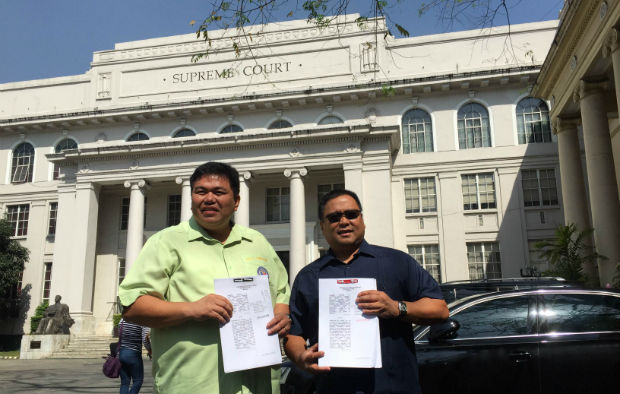Stop MRT heartless fare hike, lawmakers ask SC

Rep. Gustavo Tambunting of 2nd district of Parañaque (left) and senator JV Ejercito. PHOTO by RYAN LEAGOGO/INQUIRER.net
MANILA, Philippines–Calling the fare increase a “heartless” imposition on low-wage earners, several lawmakers and labor leaders on Tuesday asked the Supreme Court to stop the rate adjustment at Metro Manila’s elevated commuter trains.
The petition was the fifth one filed in the high court against the fare increases at the Metro Rail Transit (MRT) 3, Light Rail Transit (LRT) 1 and LRT 2 after the adjustments took effect on Jan. 4.
The adjustments raised the fares by 50 to 87 percent and imposed a base charge of P11 and an additional P1 for every additional kilometer, affecting some 1.2 million daily commuters.
“With such increase, the living wage of small income earners, who mostly compose the ridership of this mass railway transport, has been diminished,” the petitioners said.
“[A]s public utility providing public service, the operation or service that this mass railway transport systems provide shall take into consideration the situation of the riding public,” said the petitioners led by Sen. Joseph Victor “JV” Ejercito and Parañaque 2nd District Rep. Gustavo Tambunting.
Article continues after this advertisementEjercito said the MRT/LRT fare increase was heartless as “a majority of the commuters are students, employees, laborers and informal wage earners who can afford to spend only a small portion of their income for transportation.”
Article continues after this advertisementService deteriorating
The senator said it was not the right time to increase the fares since MRT service was deteriorating. “We hope the Supreme Court will consider the plight of the masses, to give them a reprieve from daily fares.”
Named respondents in the petition were Land Transportation Franchising and Regulatory Board (LTFRB) Chair Winston Ginez, Transportation Secretary Emilio Abaya, MRT 3 officer in charge Renato Z. San Jose, Metro Rail Transit Corp. and Light Rail Manila Consortium administrator Honorito D. Chaneco.
The petition cited how the Department of Transportation and Communications (DOTC) had exceeded its mandate in issuing an order on Dec. 18 that enforced the fare hike on Jan. 4. It said rate adjustments for public transport were under the authority of the LTFRB.
Hearing requirements
“The DOTC failed to coordinate and/or direct the LTFRB to comply with the publication, notice and hearing requirements. This is the function of the LTFRB as provided in EO (Executive Order) No. 202,” the petition said.
“Instead, the DOTC unilaterally proposed, approved and implemented the fare adjustment. The DOTC has no authority to issue the assailed department order. It is therefore null and void,” it said, echoing earlier suits against the fare increase.
The petitioners said the executive order granted the LTFRB the power to “determine, prescribe and approve and periodically review and adjust reasonable fares, rates and other related charges relative to the operation of public land transportation services, provided by motorized vehicles.”
“With this, the DOTC was left only with the power of administrative supervision and control over LTFRB,” the petition read.
It said Ginez and Abaya had committed grave abuse of discretion amounting to lack or excess of jurisdiction “in respectively approving and issuing” the DOTC order.
The two officials committed the same abuse for allowing the fare increase despite the LTFRB requirement for a public hearing before a fare hike could be imposed, the petition said.
It also cited Article 8 of the Constitution, which “mandates responsibility on the part of the state to put in paramount consideration public interest at all times to give priority to the greatest good for a greater number.”
“[T]he determination of whether or not such increase is necessary must be made with high level of scrutiny. Given the circumstances surrounding the issuance of the assailed department order, the requirement of full public disclosure was not met by the government,” it said.